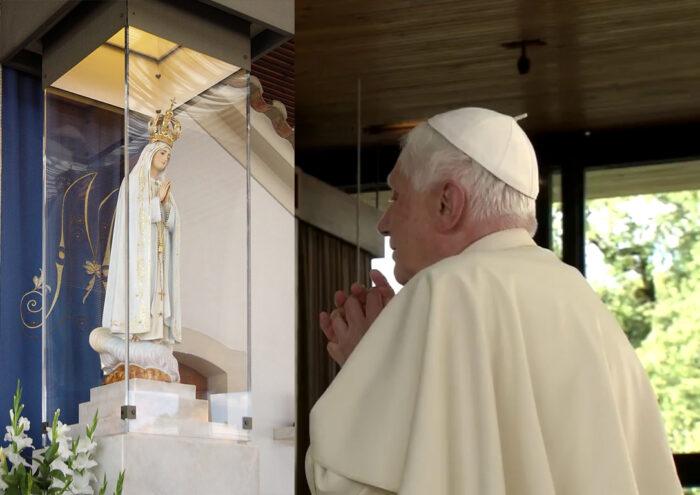
The upcoming Consecration of Russia and Ukraine to the Immaculate Heart of Mary leads us to considerations about the Church and Benedict XVI.
Newsroom (20/03/2022 8:51 PM, Gaudium Press) Following the numerous requests of the Catholic people and the recent supplications of the Bishops of the Latin Rite of Ukraine, the announcement made on 15 March by the Holy See regarding the consecration of Russia and Ukraine to the Immaculate Heart of Mary, to be held on the 25th of this month, came as a surprise.
The magnitude of the effects of a request made more than a hundred years ago by the Virgin of Fatima is such that it is difficult for us to connect the dots regarding it; or to dare to imagine the profound reasons that have led the Holy See to take this position now.
Conversely, it seems designed not to base this position on the present conflict between Russia and Ukraine – a mere tip of the iceberg formed in the convulsed ocean in which we live – where the only beacon capable of pointing true north is the Church.
The deepest causes of the events unfolding are therefore founded in the Church, since She alone is capable of shedding light on them; and among Her members, of course, especially in the figure of the Pope, holder of the office of Vicar of Christ.
Indeed, there have been many wars since the Virgin of Fatima asked that Russia be consecrated to Her Immaculate Heart: no fewer than two world wars … This proves, therefore, that the war was not the trigger for the desire to consecrate Russia, but something quite different: is not this war the beginning of the events foretold by Fatima? And is not this the reason for a renewed remorse and the desire to save the Church from the persecutions, the martyrdoms and the sufferings of the Holy Father, and now for the calls for such a consecration?
In this murky panorama, although the Mass will be presided over by Francis, in which Russia and the Ukraine will be consecrated to the Immaculate Heart, the figure of Benedict XVI re-emerges, and for two reasons:
First: As Prefect of the Congregation for the Doctrine of the Faith, Ratzinger had access to the prophecies and secret archives of the Vatican; more than anyone else, he is witness to the past and connoisseur of the future.
Second: Although with a remarkable vitality, in view of his venerable age, he is approaching 95 years of age. Would there still be enough time to heed Our Lady’s request, measuring and calculating very carefully all the consequences of such an act?
In this vein, the reader, and faithful Catholic, should recall what Benedict XVI said about the message of Fatima, when he visited the Shrine in May 2010: “Those who think that the prophetic mission of Fatima is finished are mistaken”[1].
1] So conscious of his mission as pastor, guide and pontiff, Benedict XVI will go down in history for being a man of unparalleled theological and doctrinal stature; for being a man of action, whose work is difficult to measure; for also being someone who does much for the Church. But will not history, by force of events, consign him to history as a man who, having done so much for the Church, has failed to do enough for her?
When the promises of Fatima are truly revealed and made known in their entirety, we will surely be surprised to find that they were fulfilled in the person of this man called to be a co-operator of the truth.
Between Fatima and the future, Benedict XVI is the centre: the link between the request and the fulfilment.
Let us pray, then, for the fulfilment of his desire, which is first of all that of Our Lady; but let us also be attentive to the future, for we fear that this Marian wish will only be fulfilled at the moment when the annihilation of nations has already begun.
By Boniface Silvestre
[BENEDICT XVI. Homily at the Shrine of Fatima. 13 May 2010. In: Insegnamenti. Vatican City: LEV, 2010, v. 6.
Compiled by Sandra Chisholm